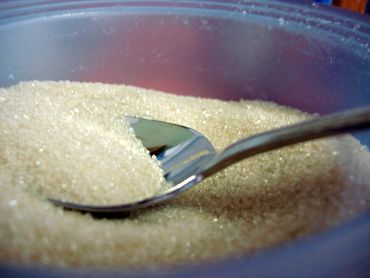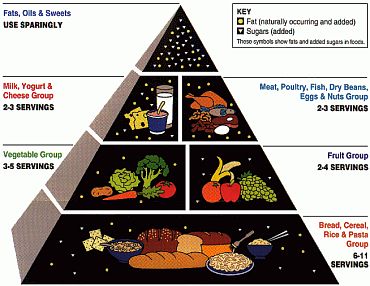
They are written about in the glossies. They are talked about at the parties. Celebrities endorse them and converted friends give you a queer look if you confess to never having heard about them.
A variety of diet fads are suddenly in vogue promising to make you slim and glow with good health. Do they work or are they merely amusing diversions for a society that has never known food scarcity? Worse, can they actually be harmful? Read about four popular diets to find out if they work for you.
Atkins Diet
You thought you need to avoid fat to lose weight? Well, the Atkins diet tells you to do just the opposite. You can eat all the fat -- and proteins -- you want. It's the carbs that you should watch out for.
To the uninitiated, Atkins may seem like a dieter's heaven. This is because it allows you to stock your plate with foods you considered taboo such as eggs, meat, butter and ghee. What's more, there's no limit to how much you eat. But wait a minute. The restriction on carbs means that many foods you enjoyed are now forbidden. While you can gradually eat some fibre-rich carbs, foods such as rice, bread, potatoes, milk and sweets will always remain a no-no. In return, Atkins promises effective weight-loss, without the dreadful hunger pangs associated with dieting.
What it advocates
Your body functions by using the energy it produces by burning carbohydrates. The extra carbohydrates you eat are stored by your body as fat. When you cut out carbohydrates from your diet, your body is forced to burn these fat reserves in the form of ketones, a process known as ketosis. Appetite is suppressed in this state, so you also end up eating less. Thus, Atkins says, achieving ketosis can help you lose weight.
What doctors say
The inadequate carbohydrates and fibre allowed by Atkins can be unhealthy. Besides, the restriction on vegetables and fruits deprives dieters of their nutritive benefits. The high protein diet could also result in bone loss, kidney or liver damage, cancer, and heart disease.
Researchers of the New York School of Medicine testify to life-threatening complications occurring because of this diet. Experts suggest that the weight loss associated with Atkins is because of the highly restrictive diet, which is harmful in the wrong run. Medically, ketosis is a state experienced during chronic starvation. It can result in unpleasant side effects such as bad breath, nausea, fatigue, constipation, or diarrhoea.

This diet, developed by Dr Dean Ornish, mainly to help reverse heart disease, is today popular with weight watchers. Its emphasis on a vegetarian diet and exercise confirms to the traditional medical approach to good health.
Ornish classifies food into three categories: those which can be freely eaten, those which should be restricted and those which should be avoided. Thus, you can eat as much of most fruit, vegetables, grains, beans and legumes as you want. You are also allowed to eat moderate quantities of non-fat dairy items such as milk, cheese, cream, or yoghurt, and egg white. But meat -- including chicken or fish, oil, fatty dairy products, nuts, sugar, honey, oily fruit such as avocado, coconuts and olives, alcohol, and commercially packaged foods having more than two grams of fat, are all taboo. Ornish recommends that your food should obtain less than 10 percent of its total calories from fat.
What it advocates
Typically, your body adjusts the rate at which it burns calories to the rate at which you consume them. This explains the sudden weight loss you experience when you first start on any diet. In a similar way, by recommending smaller, more frequent meals, the Ornish diet seeks to maintain your metabolism rate and prevent you from over-eating.
The high-fibre and low-fat diet slows the absorption of food and maintains healthy blood glucose levels. The diet also includes exercise to maintain metabolism and burn fat. Besides, the Ornish diet recommends meditation and other stress-relieving exercises to help dieters de-stress and thus, avoid over-eating.
What doctors say
Its long list of restrictions may make it difficult for non-vegetarians to follow the Ornish diet. The diet forbids all fat, including polyunsaturated and monounsaturated oils that are good for the heart.

The raw food diet, as the name suggests, is about eating only raw and usually organic food that is untarnished by any form of cooking or processing. Sounds a bit extremist? Well, as a concession, some amount of cooking is allowed, typically by blowing hot air from a dehydrator at a temperature less than 120 degrees F.
For obvious reasons, most raw food eaters consume a restricted diet of fresh or dried fruit, vegetables, nuts, grains, seeds, beans and some dairy products. The more adventurous, however, also include raw meat and fish. They believe raw foods can not only help you remain naturally healthy, but also cure conditions such as chronic fatigue, cancer, colitis, and Crohn's Disease.
What it advocates
Raw foods contain enzymes such as amylases, proteases and lipases which help in digestion. Cooking destroys these enzymes and interferes with natural digestion, leading to obesity and chronic diseases. Raw foodists thus believe that raw foods are more nutritious than cooked and processed foods. They refer to ethnic tribes such as the Inuits and the Nenets who mostly eat raw meats, fish and berries and are healthier than other Westerners.
What doctors say
Most doctors endorse a diet rich in fruit and vegetables, especially since it eliminates unhealthy foods such as saturated fats and refined sugars. But raw is not always better. Iron absorption from cooked vegetables, for instance, is generally much better than from their raw forms.
Also, eating raw meat or fish could lead to food poisoning and is not recommended. Doctors say that a raw diet is particularly harmful for pregnant women, children and those who are anaemic or at risk of osteoporosis.
A Washington University School of Medicine study recorded abnormally low bone mass in vegetarian raw foodists. Side effects such as headache, nausea and depression too have been reported.

This diet was popularised by a book Sugar Busters, written by four authors, three of whom are doctors. The book blames sugar, rather than fat or carbs, as the main culinary culprit. Cutting it out from your diet, the authors propose, can achieve good health, lower cholesterol and fight diabetes.
The diet imposes few restrictions. Apart from refined sugar, you need to give up honey, molasses, sugar-based drinks, beer, potatoes, white rice, corn, white bread, beetroots and carrots. The diet encourages you to have three medium sized meals per day and snack on fruit or nuts. Fruit juices are best passed over for whole fruit and those who cannot give up alcohol are permitted red wine.
What it advocates
When you eat foods high in sugar or carbohydrates, the glucose level in your blood increases. In response, the pancreas releases a rush of insulin that converts much of the glucose into fat. In contrast, foods low on carbohydrates and high in protein cause the pancreas to release less of insulin but more of the hormone glucagon. Glucagon helps your body to burn stored fat for energy, thereby promoting weight control. In contrast insulin, claim the authors, actually prevents stored fat from being used. Eating foods that release less insulin, they theorize, helps to decrease insulin resistance, a condition responsible for obesity and type 2 diabetes.
What doctors say
The logic hasn't impressed the experts. Most doctors do not think that choosing calories from certain sources, as opposed to others, can help to lose weight. They deny that diet plays a role in causing or preventing insulin resistance and debunk the claim that it can prevent diabetes. At best, the high protein Sugar Busters diet causes fatigue, weakness, and irritability. At worst, it can cause bone loss, and kidney or liver damage.

Mumbai-based consulting physician, Dr Arora M P Singh, adds a caveat about enrolling for diet plans on a whim. "People rely on diet fads to lose weight quickly instead of cultivating healthy eating habits. The result is that once they leave the diet, their weight rockets again. In some cases, such as in people with sub-clinical thyroid, dieting can lead to further complications," he says.
To avoid this, he explains that people wanting to lose weight should get themselves medically evaluated first. This way, physical or psychological conditions that usually lie at the root of obesity can be diagnosed and treated. "Diet plans also need to be adapted to suit each individual's body and temperament," he says.